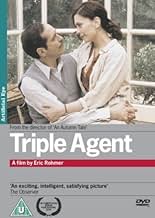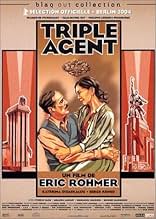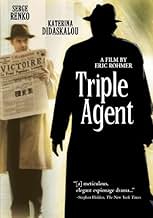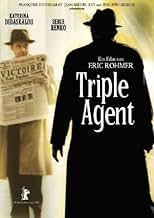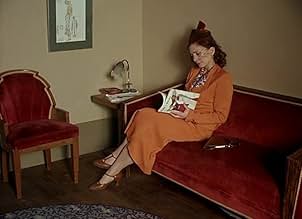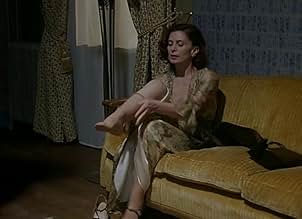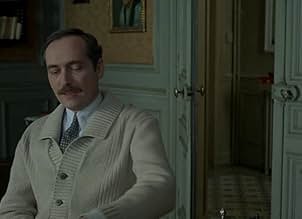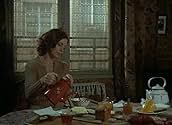Triple agent
- 2004
- 1 घं 55 मि
अपनी भाषा में प्लॉट जोड़ेंFrance, 1936-37. The Popular Front wins elections, the Spanish Civil War begins, and Hitler and Stalin are manipulating and spying. The brilliant exile, Fiodor Voronin, a general at 20, is t... सभी पढ़ेंFrance, 1936-37. The Popular Front wins elections, the Spanish Civil War begins, and Hitler and Stalin are manipulating and spying. The brilliant exile, Fiodor Voronin, a general at 20, is the deputy at the White Russian Military Union, probably slated to replace the aging Généra... सभी पढ़ेंFrance, 1936-37. The Popular Front wins elections, the Spanish Civil War begins, and Hitler and Stalin are manipulating and spying. The brilliant exile, Fiodor Voronin, a general at 20, is the deputy at the White Russian Military Union, probably slated to replace the aging Général Dobrinsky soon. Fiodor's Greek wife, Arsinoé, paints and stays away from politics, befri... सभी पढ़ें
- पुरस्कार
- कुल 1 नामांकन
- Amiral Galinine
- (as Alexandre Tscherkassoff)
फ़ीचर्ड समीक्षाएं
Do they team up with Germany, their enemy from the Great War, and now much further from their own ideas, run by vulgar Nazis rather than a right-wing elite close to their own view? Or do they keep their heads down and hope to avoid upsetting France's Popular Front government, which does not like them? How do they react to the Spanish Civil War?
There are also surviving links with Red Russia, especially with Tukhachevsky, from a similar social background but the Red Army's top commander.
The real-life basis concerns General Evgenii Miller (Dobrinsky) and General Nikolai Skoblin (Fiodor). I'll not say more, to avoid spoilers. Just that the film does not give a definite solution to the mystery, though it points to one. You can find one account on the Wikipedia. On the DVD you find Skoblin's niece giving a very different interpretation.
Despite unresolved mysteries, and some liberties taken with solid fact, I found this a very watchable film.
Those who hate Eric Rohmer's works, his intellectual halo, his never ending dialogs will definitely hate "Triple Agent" as well. Yes, there are so much conversations, so many dissertations... and eventually you may lost the thread of the plot. I mean, this movie is not like "Summer tale", here you got stuff like spying and so, you have to know who's who, and that's pretty hard if the characters don't stop talking about anything. Maybe I'll have to watch it again so I get everything figured out.
PS: I'd like to underline the work of wonderful Greek actress Katerina Didaskalu. She's fascinating, and I hadn't have the occasion of watching her in a movie before.
My rate: 6.5/10
I remember quite clearly how much I appreciated and had a good view of these times through the struggles Rohmer painted in this couple of Arsinoe (Katerina Didaskalu) and Fiodor (Serge Renko). It's interesting too to see how Arsinoe is basically apolitical in the early part of the film, and yet through the circumstances that follow both health-wise and elsewhere in the world her views begin to change. At the same time there is a spying sub-plot that is given weight by the attention to the scenes with the characters as opposed to just outright action. There's something that is fond for a movie viewer when seeing such difficult times portrayed simply, but with the conflicts brimming at the seams. It's not only about the political toss-and-turning going on, but about the loss of their insulated relationship, and what ultimately leads to what becomes of them. It's based on a true story as well, which adds some weight to it, and it's also as I recall filmed with the clarity that I've seen in the other (few) Rohmer works I've come across. A worthwhile viewing at the festival, and hopefully will get some airplay on IFC or Sundance or other for fans of the old Cashiers alumni.
Rohmer's mastery: His use of authentic buildings of the period with subtle deco stylization and other White Russian meeting points (the canteen of the Rachmaninov conservatory and a wooden Orthodox church near Butte-Chaumont), along with brilliant dialogues subtly lit with conversation on Picasso, Abstraction and realism in Art. Both the Communist couple and the White Russian couple in the movie will be steam-rolled by the events. Rohmer's use of newsreels is also extremely symbolic. The Paris World Fair of 1937 is shown with its stone colossus in the competing Soviet and Fascits pavilions seeming ready to crush the movie's characters as the end appears.Blum is seen making a speech among a forest of risen fists.
The relativity of life and that of free-will is the real subject. Is Fiodor pulling the strings or is he just just one of the puppets lost in the dubious cauldron of the Germano-Soviet pact of 1939 brewing in the shadows? Extraordinary work of a mature genius that makes one think that freedom is just appearance. Great actors with the beauty of french spoken rolling the Rs (Fiodor) or whispering them (his wife). Tragic unexpected ending. Rohmer revisits Hitchkok for a final "Coup de Theatre"!
क्या आपको पता है
- ट्रिवियाThe real-life inspiration for Arsinoé was Russian, much like her husband. Her nationality was changed for the film, so the two characters would have an in-story justification for speaking French to each other.
- साउंडट्रैकChanson des jeunes Travailleurs
Music by Dmitri Shostakovich (as Dimitri Chostakovitch)
Lyrics by Jeanne Perret
Performed by La Chorale Populaire de Paris
© Editions La Chant du Monde
टॉप पसंद
- How long is Triple Agent?Alexa द्वारा संचालित
विवरण
बॉक्स ऑफ़िस
- दुनिया भर में सकल
- $2,56,205
- चलने की अवधि1 घंटा 55 मिनट
- रंग
- ध्वनि मिश्रण
- पक्ष अनुपात
- 1.37 : 1
इस पेज में योगदान दें


